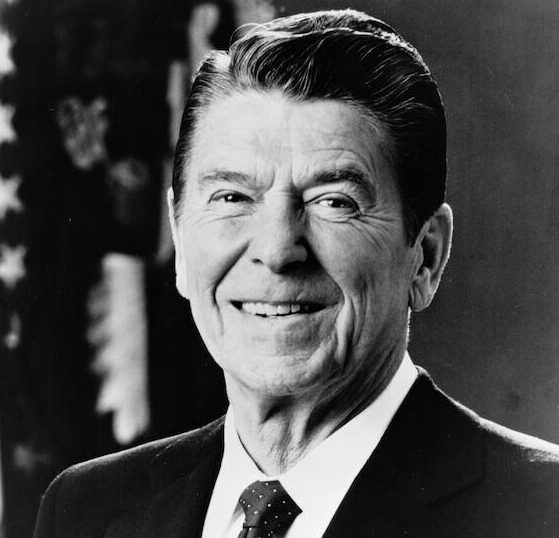Are you better off than you were 40 years ago? I wasn’t alive 40 years ago, but the many who were seem fond of the 1980’s. As a child of the early 90’s, I look back on that decade with fondness and nostalgia. So, I can relate.
This 90’s nostalgia was created due to a golden age decade that saw America’s rise to the sole superpower in the world and abundant economic growth. But how did this come about?
Many factors contributed, but I see strong American leadership and an ideological agenda set forth by the succession of three presidents from 1980-2000. None more important to this than President Ronald Reagan, who built the foundation in the 1980’s.
As an independent, I’ve always had a personal and unofficial rule on presidents. I usually like to see the president’s political party change every 8 years unless things are going exceptionally well.
I believe this concept because of political ideologies and values. We need the different ideologies and values of both parties to move the country forward in a positive direction. And that if one party holds power too long, the country can grow stagnant and start to deteriorate.
And this is happening now. Not because the presidency hasn’t changed parties but because the Republican party has gotten away from their true ideologies and values. Ideologies and values needed to prevent current stagnation and deterioration. Ideologies and values put in place by Ronald Reagan.

Evil Empires
“We cannot shirk our responsibility as the leader of the Free World, because we’re the only one that can do it. And therefore, the burden of maintaining the peace falls on us. And to maintain that peace requires strength.” That’s a quote from Ronald Reagan in the 1980 presidential debate and an ideology that changed Americas direction.
Throughout the 1970’s, the United States pursued a policy known as Détente with the Soviet Union. It was the brainchild and important foreign policy position of President Richard Nixon.
The Détente policy was one of negotiation and concession with the Soviet Union. Nixon believed that the United States had things the Soviet Union wanted, like power recognition and economic opportunities. And that the United States could negotiate and concede those things for what we wanted, the Soviets pulling back support for communist governments and adding support for human rights.
However, this did not work well, and many, including Ronald Reagan, believed that the United States was being taken advantage of and falling behind the Soviet Union.
The Soviet Union continued to build up its nuclear arsenal in the 1970s and did not pull back support for communist governments; case in point, when they invaded Afghanistan in 1979 to support the communist Afghan government.
Reagan believed we were losing the Cold War and needed to reestablish American power. That by eliminating Détente and confronting the Soviet Union with strength, we could establish peace.
And he put his money where his mouth was. Reagan rebuilt the military, spending more money than ever before in U.S. history.
He declared the Soviet Union the evil empire and initiated projects like SDI, strategic defense initiative, that was forward-thinking, even if it wasn’t technologically possible in the end.
This put the Soviets back on their heels, and many believe that, along with the cost and losses of the Soviet-Afghan War, the Soviet Union went broke trying to compete.
And once the Soviet Union began to change ideologies and embrace a more liberal stance under Premier Mikhal Gorbachev, like any great leader, Reagan adapted.
Based on his established position of strength, Reagan was able to engage in great diplomacy with Gorbachev. The United States and the Soviet Union, for the first time, reduced their number of nuclear weapons in 1986, and the two men had a positive relationship.
By the time he left office, the Cold War was ending and officially ended under his vice president and 41st President, George H.W. Bush.
Why does all this matter today? Because we are in a similar state to that of 1980.
We have a potential Cold War 2 lurking, with the rise of communist China and a rampant authoritarian Russia. Who, if they continue to gain power and expand, could rival or surpass us as global superpowers.
And we also still have our 21st century foreign threats, with an emboldened Iran and terrorist organizations causing chaos in the Middle East.
Yet we have no Reagan or Reagan ideologies in sight.
Thanks to the populist-controlled Republican party, we have an ideology of isolationism and neo-détente, thinking we can ignore problems and negotiate and concede with authoritarian governments. The antithesis of Ronald Reagan.
The populist Republicans are against everything Reagan talked of in the quote above. They shirk our responsibility as the leader of the free world and don’t understand that we are the only ones who can maintain peace in an anarchic international order.
They have no big-picture and long-term world views as Reagan did. They only care for present hedonistic concerns and don’t realize this could have dire consequences.
This has left the Democratic party as the party of foreign policy strength. And while diplomacy and a multilateral approach are important, as we saw above, there is a time and a place.
The Democrats and their liberal internationalist ideology are not equipped to deal with the current threats we have. And on top of that, we’ve had these policies for too long.
After 8 years of Barrack Obama and now 3 years of Joe Biden, the years are adding up, and the policies are going stale.
Just like in 1980, we need a Ronald Reagan to change our direction.

Grand Old Politics
Like foreign policy, our current domestic policy has a similar feel to 1980.
The 1980 economy was gripped by inflation for years but also had low growth, resulting in stagflation. Americans lacked faith and had negativity toward the government and the country. Primarily due to Richard Nixon and the Watergate scandal, but also to Jimmy Carter, who created a feeling of discouragement among Americans.
Reagan developed a 4-point economic plan he outlined to Congress almost immediately after taking office.
It reduced growth in government spending and taxing, eliminating unnecessary and counterproductive regulations, and encouraged consistent monetary policy.
This became known as Reaganomics, and many believe it created the foundation for the economic expansion in the following years.
Among the Reaganomic policies was tax cuts. Which took place in 1981 and 1986. The latter being a tremendous bipartisan achievement called the 1986 Tax Reform Act. It lowered tax rates for normal income and raised tax rates for capital gains.
This showed one of Reagan’s greatest qualities, his ability to embrace bipartisanism.
While Reagan is a conservative hero for many Republicans, I view him as very much a moderate.
He not only worked with Democrats on the 1986 Tax Reform Act but also embraced a moderate view of the issues when needed for the country.
Reagan worked with speaker Tip O’Neill on bipartisan social security reform in 1983. He appointed the first woman, Sandra Day Oconnor, to the Supreme Court and even did something that would seem impossible today: reformed immigration.
He did this in 1986 by signing the Immigration Reform and Control Act that granted amnesty for millions of undocumented workers. He did this because he realized the importance of immigrants and their role in the American economy. He called this “an example of a truly successful bipartisan effort.”
You will never hear about this immigration reform from Republicans or Democrats today. Nor will you hear about Reagan’s moderate policies, but they are sorely needed amid similar issues.
Both parties have lost all sense of bipartisanship and moderation.
None of these economic and social reforms could be passed today. And while I’ll be doing another article on how and why the economy is the way it is, many aspects of Reaganomics could be beneficial today. Hint: consistent monetary policy is kind of important.
All in all, we need a significant shift from both parties. And that shift for the Republicans needs to be back to these ideals of Ronald Reagan.
Ronald Reagan changed the energy of this country. His contagious optimism, honesty, and charming personality are why he is known as the great communicator. The opposite of the great dividers we have today.
Ronald Reagan came into office and restored faith in government and restored faith in the Republican party.
We need someone to restore that faith again.

Excellent read Jake